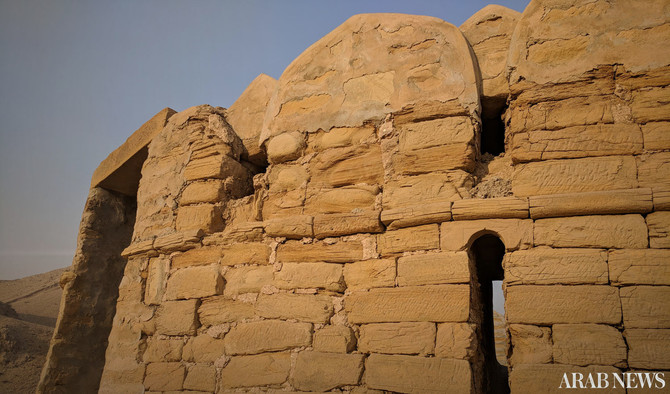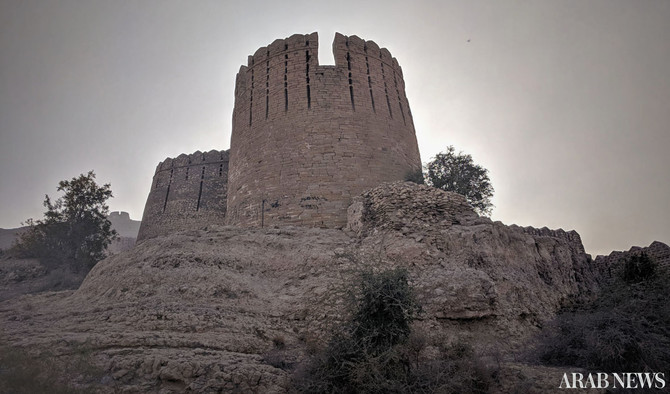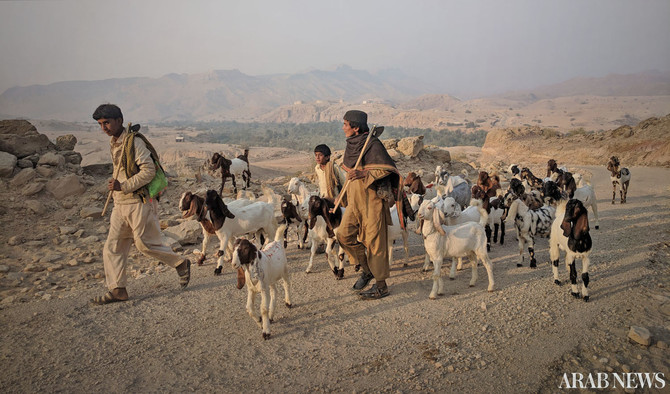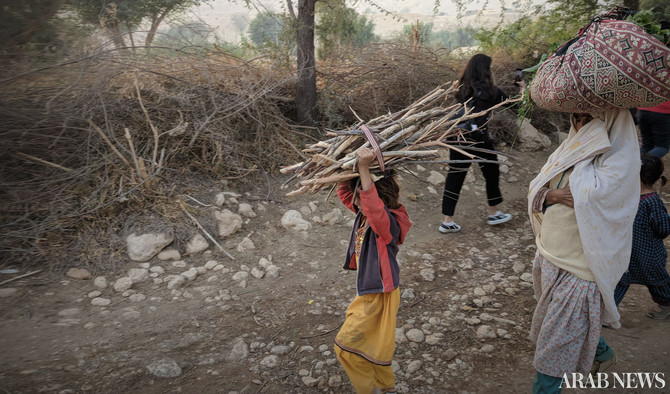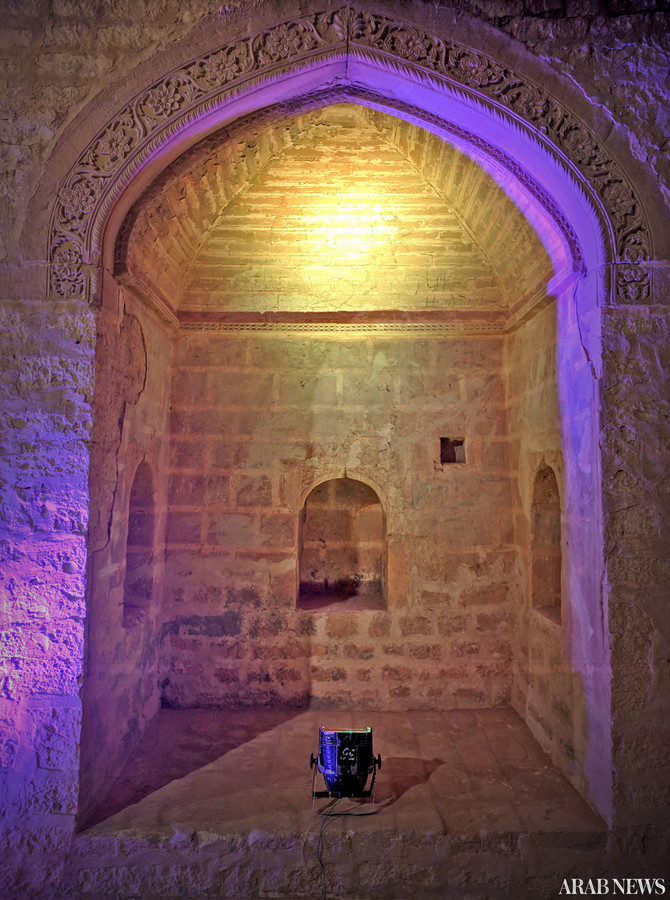KARACHI: Residents of the historic Ranikot Fort in Pakistan’s Sindh province have told the same stories to their children for centuries — that the mountains surrounding the citadel are home to fairies who descend from the skies to drink water from a pool – known as “Paryun Jo Tar” (fairies’ pond) in the wee hours of the day.
So popular is the myth that it is narrated in great detail by all the families — hailing from the Gabol, Khosa, and Rustamani tribes — who live in the Ranikot Fort area which, according to some accounts, was used by Cyrus the Great as his military garrisons.
“Once upon a time, an elder of the Gabol tribe noticed that some exceptionally beautiful creatures came down from the mountains at the break of dawn, drank water, and flew right back into the highlands,” Syed Gayoor Abbas, an official of the culture department who mans the Fort, told Arab News on Wednesday, adding that the pond in the area got its name after the incident.
The huge fort, with a circumference of approximately 32 kilometers, 36 watchtowers, two fortresses, and a gushing spring, connects several mountains of the Kirthar range, the official said, adding that: “The history of this fort has always been a mystery. There are several different and contending narrations.”
“It is built of sandstones and limestones,” he continued, “which have been held together by lime and gypsum plaster that has, with a passage of time, made the structure much harder.”
The fort has four gates: the Sann Gate is the main road entrance; the Shah Per Gate; Amri Gate; and Mohan Gate that faces the famous Mohenjo-Daro historical sites.
The Mirikot fortress, located in the heart of Ranikot, was apparently designed as the administrative center and royal residence, Abbas said, adding that the other small fortress was called Sher Garh, which was built in the mountains.
Its periphery, he added, measured 1,434 feet, with five bastions and a double gate entrance. The stronghold has two arched vaults of sandstone containing gorgeous carvings with a scroll of pomegranates, sunflowers, and peacocks. The fortress was divided into six areas, including three with residential portions that have seven rooms with slanting roofs. “The three flat-roof rooms belong to the British period,” he said.
Residents of Sindh’s Ranikot Fort hang on tight to their fairytale and military might
Residents of Sindh’s Ranikot Fort hang on tight to their fairytale and military might

- Huge structure has 36 watchtowers and two fortresses
- 12 km long surrounding wall is often referred to as “The Great Wall of Sindh”
As monsoons arrive, livestock shelters stand between survival and ruin for Pakistani farmers

- Farmers still recovering from 2022 floods say livestock losses pushed entire communities into deeper poverty
- Local groups are building climate-resilient animal shelters, experts call for larger policy shifts to protect rural livelihoods
KHAIRPUR: Pakistan: Three years after floods drowned Rasool Bux’s village in Pakistan’s southern Sindh province, he still fears every drop of rain.
The 52-year-old farmer from Gul Muhammad Sanjrani village in Khairpur worries another deluge could wipe out what little he has rebuilt. His animals are the main source of income for his family of seven. He sells about five kilograms of milk daily to keep the household running.
The 2022 floods were among the worst climate disasters in Pakistan’s history, pushing millions into poverty and devastating agricultural regions in the Sindh province. As new monsoon rains lash the province, farmers and experts say protecting livestock, often the only safety net for rural households, must be a national priority.
“We are afraid because of what we saw during the 2022 floods,” Bux told Arab News while feeding his two buffaloes and three cows at one of around 200 new climate-resilient shelters built by German relief organization Malteser International in collaboration with the Sindh government.
“Most villagers decided to leave their houses. We are poor people, so we stayed here on the road. Some of our animals perished.
“Then, there were also so many mosquitoes here. The nights were spent in sadness. We didn’t have the money to keep our remaining animals under mosquito nets.”
Today, the shelters are helping local farmers like Bux recover what the disaster swept away.
“These [shelters] are very beneficial to us since we used to have a lot of trouble while gathering our livestock,” he said.
“Our animals are at peace now.”
Livestock is the backbone of rural Pakistan’s economy, especially for families who may own no land. According to the Economic Survey of Pakistan issued in June, the sector supports over 8 million rural households, providing about 40 percent of their incomes and around 15 percent of the country’s GDP.
In a year when agriculture overall grew by just 0.6 percent, partly due to extreme weather, livestock still contributed 4.7 percent to the sector, the largest share.
Sindh, Pakistan’s second-largest crop-producing province, is especially vulnerable to floods. Around 930 kilometers of the Indus River snake through the region, making it one of the most flood-prone areas in the country, according to the International Growth Center.
In May, the International Monetary Fund (IMF) approved around $1.4 billion in climate financing for Pakistan under its Resilience and Sustainability Facility (RSF), designed to strengthen the country’s defenses against future climate shocks and promote sustainable growth.
Local groups working on the ground hope the government will channel some of that money toward projects like climate-resilient animal shelters in flood-affected areas like his village.
“The need for animal shelters here is huge,” said Muhammad Junaid Soomro, a project engineer at the Sindh Rural Support Organization (SRSO), which is partnering with Malteser. “Even 300 to 400 such units will fall short of the need we have here on a union council basis.”
“We are working in five union councils only, while there are 89 union councils in this district,” he added, urging the government to prioritize livestock and agriculture in flood-hit areas once the IMF funds become available.
“They [Malteser] have made these shelters with a small amount of available funds. These can be made more climate resilient with the IMF’s climate resilient funding,” Soomro said.
In a written response to Arab News, the IMF said the RSF financing is meant to back broader policy reforms, not specific projects like livestock shelters.
“However, there are a number of ways in which the RSF will help to build climate resilience in Pakistan that will benefit Pakistanis living in flood-prone areas, such as farmers,” the IMF’s resident representative in Pakistan said.
He said the RSF supports reforms targeting water management and irrigation infrastructure, aiming to improve reliability and tackle issues like waterlogging, salinization, groundwater depletion and water insecurity.
“The RSF’s reforms take a whole-of-government approach, with some to be implemented at the provincial level,” the IMF representative added, noting that improved coordination between federal and provincial authorities will be key.
“LIVING BANK”
While larger, policy-level shifts are awaited, groups like Malteser and SRSO are meanwhile focused on immediate fixes, building small, elevated shelters that offer some protection from future flooding.
“We felt the need for building these here as the disaster, the flood had devastated our animal shelters as well as our homes in the community,” said Kanwal Hussain, a project officer at SRSO.
The bamboo, plastic and mud shelters are raised about three feet above ground level, with canopy walls to stop rainwater from pooling and weakening the roof.
“We have built a canopy wall so rainwater does not stay there and damage the roof,” Soomro said.
Imdad Hussain Siddiqui, who served as a director of operations at the Provincial Disaster Management Authority of Sindh during the 2022 floods, described livestock as a “living bank” for rural families.
“Animals are the sole remaining resource where land and crops are swept away by flooding because they provide rescue, safety and the sole avenue through which families can recover and rebuild their lives,” Siddiqui told Arab News.
He said the loss of 1.1 million animals during the 2022 floods meant “direct destitution and long-term poverty” for many families.
“Strong infrastructure of livestock will enable such linkages to recover in the near future, permitting economic activity and income-generating opportunities for the affected people,” Siddiqui explained.
In 2022, the international NGO Germanwatch ranked Pakistan first on its Climate Risk Index due to extreme weather events including floods, landslides and storms during the intense monsoon season.
Pakistan is already in the grip of another punishing monsoon, with over 60 people killed in rain-related incidents in just one week, a reminder that the next flood is never far away.
For farmers like Rasool Bux, every storm brings up the memory of what was lost in 2022 — and what could be lost again.
“More such shelters should be built in our village where some people can afford to build them while others cannot,” he said.
Pakistan offers condolences as Texas floods death toll rises to 50

- Floods in Texas began on Friday as months’ worth of rain fell in a matter of hours
- Shehbaz Sharif hopes ongoing rescue efforts help save more lives from calamity
ISLAMABAD: Pakistan’s Prime Minister Shehbaz Sharif offered condolences to US President Donald Trump this week as the death toll from flash floods in Texas rose to 50, with American rescuers continuing the search for missing persons.
The flooding began in Texas on Friday — the start of the Fourth of July holiday weekend — as months’ worth of rain fell in a matter of hours.
The National Weather Service (NWS) has warned that more rain has been forecast, and that “excessive runoff may result in flooding of rivers, creeks, streams and other low-lying and flood-prone locations.”
“Deeply saddened by the loss of precious lives in the tragic flash floods in Texas, USA,” Sharif wrote on the social media platform X on Saturday night.
“Hope the ongoing rescue efforts will be successful in saving more people from this natural calamity.”
Monsoon rains have wreaked havoc in several parts of Pakistan since June 26, with the country reporting at least 66 deaths and 127 injuries due to rain-related incidents.
A deadly flash flood in the scenic Swat Valley, caused by a sudden rise in water levels due to monsoon rains, killed 13 members of a single tourist family last week.
“Having suffered a similar incident in northwest Pakistan just a few days ago, we can fully understand the pain and suffering of the bereaved families,” Sharif said.
“Our thoughts and prayers are with President Trump @realDonaldTrump and the American nation at this difficult time,” he added.
Flash floods, which occur when the ground is unable to absorb torrential rainfall, are not unusual.
But scientists say that in recent years that human-driven climate change has made extreme weather events such as floods, droughts, and heatwaves more frequent and more intense.
With additional input from AFP
Death toll from Pakistan building collapse climbs to 27

- Final search operation underway, most of the debris cleared, says rescue official
- Collapse exposes issue of unsafe housing in city, home to over 20 million people
KARACHI: The death toll from a five-story building collapse in the southern Pakistani city of Karachi has risen to 27, a police surgeon confirmed on Sunday after rescuers pulled more bodies from the rubble.
Pakistan’s leading rescue emergency services, including Rescue 1122, continued to recover bodies from the Fotan Mansion residential building. Several families were said to be living in the building, which crumbled around 10 am on Friday in the impoverished Lyari neighborhood of the city.
The building collapse has once again laid bare the issue of unsafe housing in Karachi, Pakistan’s largest city by population.
“With more bodies recovered from the debris this morning, the death toll has risen further,” Dr. Summaiya Syed, a police surgeon, told Arab News. “So far, we have received 27 bodies.”
Hasaan Khaan, a spokesperson for the Rescue 1122 services, said most of the debris has been cleared at the site.
“Clearance and the final search operation is now underway and will be completed in the next couple of hours,” Khan said.
‘DANGEROUS’ BUILDING
Many of the building occupants were members of the low-income Hindu minority community and residents estimated that around 40 people were inside when the building collapsed.
According to the Sindh Building Control Authority (SBCA), Fotan Mansion had been declared unsafe three years ago.
“This building was declared dangerous by the SBCA in 2022 and had been served multiple notices over the years,” SBCA spokesperson Shakeel Dogar told Arab News on Saturday.
“Before the recent rains, public announcements were also made in the area, but unfortunately, no one was willing to vacate.”
Friday’s incident is the latest in a string of deadly building collapses in Karachi.
In February 2020, a five-story building collapsed in Rizvia Society, killing at least 27 people. The following month, another residential structure came down in Gulbahar, claiming 16 lives. In June 2021, a three-story building in Malir collapsed, killing four. And just last year, in August, a building collapse in Qur’angi led to at least three deaths.
Mayor Wahab said on Friday evening that rescue efforts remained the city government’s top priority, with accountability and investigation to follow.
“Once we’re done with the rescue aspect, we will focus on who was responsible for this negligence or omission,” he added.
Minister orders probe into killing of barking deer on Islamabad’s Margalla Hills

- The South Asian country has witnessed frequent incidents of violation of wildlife laws
- This week, an escaped pet lion attacked a woman, two children in a busy street in Lahore
ISLAMABAD: Pakistan’s Minister for Climate Change and Environmental Coordination Dr. Musadik Malik has taken notice of the killing of an endangered barking deer on Islamabad’s Margalla Hills and ordered a probe into the incident, the Press Information Department (PID) said on Saturday.
Barking deer, also known as Indian muntjac, are found in isolated populations within Margalla Hills National Park, Khanpur Range and Lathrar near the Pakistani capital of Islamabad. They are considered endangered in Pakistan due to their restricted range and declining population.
A disturbing video circulating on social media this week showed three men slaughtering the rare animal on the roadside and has sparked public anger and calls to investigate the incident.
Climate Change and Environmental Coordination Minister Malik condemned the hunting and killing of wildlife in protected areas, according to a PID statement.
“Such acts of cruelty and disregard for conservation laws are unacceptable and will not be tolerated,” the minister, who has sought a report from authorities on the incident, was quoted as saying.
Separately, the Islamabad Wildlife Management Board (IWMB) said it had filed a complaint with police, seeking action against the ones involved in the incident for violating the Islamabad Nature Conservation and Wildlife Management Act.
“Barking deer is a protected animal under Schedule 1 of the act,” the IWMB said on X. “A request has been made for action under sections 12.4(a) and 16.1(a) of the Nature Act 2024.”
The board said a violation of the relevant section of the law is punishable by a fine of Rs1 million ($3,523) and imprisonment for a term of up to one year.
Pakistan has witnessed frequent incidents of violation of wildlife laws.
An escaped pet lion chased a woman and two children down a busy street in Pakistan’s Lahore, police said Friday, with dramatic footage showing the big cat leaping a wall before pouncing on them. All three were taken to hospital but were not in a critical condition.
Keeping exotic animals, especially big cats, as pets has long been seen as a sign of privilege and power in Punjab, the most populous province of the country.
Police said they had arrested three men.
“The suspects fled from the spot, taking the lion with them. They were arrested within 12 hours of the incident,” the office of the Deputy Inspector General Operations in Lahore said.
The lion, an 11-month-old male, has been confiscated by police and sent to a wildlife park.
Pakistan, UAE agree to boost cooperation in higher education, human resources

- The UAE is home to over 1.5 million Pakistanis who send more than $5 billion in remittances annually
- Both countries resolve to work on initiatives to benefit students, academic institutions and professionals
ISLAMABAD: Pakistan and the United Arab Emirates (UAE) have agreed to strengthen bilateral cooperation in higher education and human resource development, the Pakistani embassy said on Saturday.
The statement came after a meeting between Pakistan’s Ambassador Faisal Niaz Tirmizi and Dr. Abdulrahman bin Abdulmanan Al-Awar, the UAE minister of human resources, higher education and scientific research.
The UAE is home to more than 1.5 million Pakistani expatriates who live and work in the Gulf country and send back more than $5 billion in remittances to the South Asian country annually.
During the meeting, Ambassador Tirmizi highlighted the contributions of the Pakistani community to the UAE’s development and appreciated the Gulf country for fostering an inclusive and enabling environment for expatriates.
“Both sides reviewed ongoing collaboration and explored avenues to further enhance bilateral cooperation in the fields of higher education and human resource development,” the Pakistani embassy said.
“The discussions reflected a shared resolve to work closely on initiatives that benefit students, academic institutions, and professionals from both countries.”
Ambassador Tirmizi reiterated Pakistan’s commitment to strengthening institutional linkages and advancing cooperation in skill development and workforce preparedness.
“Minister Dr. Abdulrahman Al-Awar lauded the longstanding and brotherly relations between the two countries and expressed the UAE’s keen interest in expanding its partnership with Pakistan in mutually beneficial areas,” the Pakistani embassy said.
“He welcomed sustained dialogue and coordination between the relevant authorities of both nations.”


